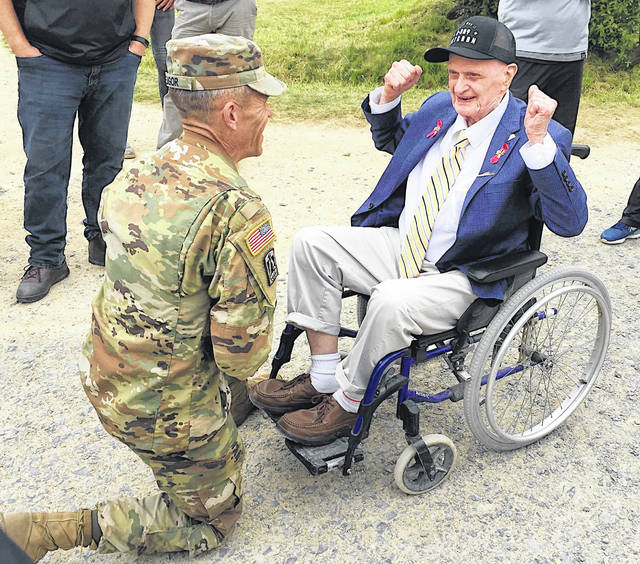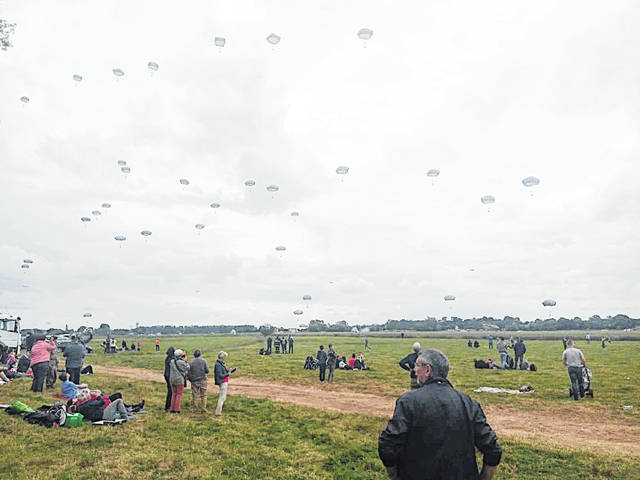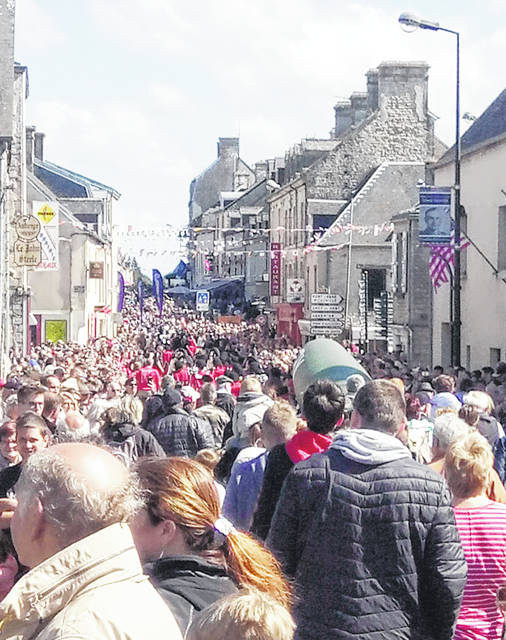


A small-town boy from Greenfield felt more connected to his roots, to himself, to everything really, as he stood recently at a landing point in the fields of Normandy, France used three-quarters of a century ago for Allied paratroopers to land during the D-Day invasion.
Shane Fligor is a 1992 graduate of McClain High School. He is the son of Steve and Vicki Fligor of Greenfield.
He has been in the Army for more than two decades, his most recent assignment to coordinate military communications in France’s Normandy region during the nearly 100 ceremonies and celebrations held to commemorate D-Day 75 years after the Allied troops’ landing on those beaches that turned the tide of German occupation in Europe.
Fligor’s primary job in the Army is as satellite communications NCO. He works with government service civilians to coordinate all satellite communications for the Army throughout Europe.
As his office plans the communications infrastructure for Army training exercises and real-world missions in Europe, his office is where a call came late on a Friday in early May requesting someone to be at the U.S. Embassy in Paris the following Monday for a planning conference regarding the Normandy D-Day commemorations.
“I went to Paris with a list of questions intending to pass it off to one of the planners when I returned,” Fligor said.
But during that meeting, he met a veteran from Normandy, and after hearing his story and meeting with several mayors of cities within the Normandy region, Fligor said, “I decided I wasn’t going to pass up this opportunity.” So he went back to Germany and told his bosses he would like to stay on as the planner.
He arrived back in France in late May to begin preparations for the ceremonies and celebrations that took place June 1-9.
On June 6, 1944, more than 150,000 Allied troops made landfall on beaches across the Normandy region. The death toll was incredibly high, but it was the beginning of Europe’s liberation from Nazi Germany. Each year, the region celebrates that day, with veterans returning to those beaches where so many lost their lives.
As Fligor went about his duties, he saw many things and was connected to his home, to the past, and to himself like never before.
Traveling from busy, bustling Paris and into the quiet and serene region of Normandy, he said he could have been back home in Highland County with the hills, the narrow roads dotted with small villages, the fields of grazing livestock and planted crops.
“The red, white and blue of the French flag could be seen waving from many homes,” Fligor said. And beside nearly all those French flags waved the red, white and blue of the U.S. flag.
Throughout his time in Normandy, Fligor had the opportunity to visit many of the memorials and sites of the epic battles.
“Everywhere I went, from the market square to Iron Mike Memorial, everyone there had a story to tell — a story of their father, grandfather, or uncle; a story that was passed down to them; a story of what their unit did at that exact spot; a story about what happened to them as a child; a story about what it was like to fight in this war,” Fligor said. “The stories from the veterans, the brave men that were there, were the stories everyone wanted to hear. Crowds would encircle the veterans with the hopes of hearing their stories. They were the ones that could truly make the stories in the history books real.”
At one point, a veteran telling his story to a crowd singled Fligor out. With his hand outstretched, he asked Fligor if the soldiers were “holding down the fort.”
“We did our part,” the veteran said. “We wrote our story and passed it to you. We’re counting on you.”
With that, the man clapped Fligor on the shoulder and said, “You’ve got this.”
Fligor said he got the sense of the story being passed to him and that it was his turn to add something.
Late the next night, a three-soldier communications team arrived at a makeshift camp near the grounds of the American Cemetery at Normandy. Fligor spoke to the younger soldiers and heard himself repeat those words, “We’re counting on you,” he said. “You’ve got this.”
“That moment was incredibly surreal. It almost felt as if the words weren’t spoken by me, but by the men and women who came before me.” Fligor said.
A heartfelt highlight for Fligor was meeting 93-year-old American veteran Carl Felton, who on June 6, 1944 was just off the shores of Normandy in a Navy communications vessel.
“As I shook Mr. Felton’s hand and we began to talk, I immediately knew I was meeting an amazing sailor and an amazing man. After a few brief moments the crowd that was around us seemed to fade away, and in my mind, it was just the two of us. As I knelt to talk to him, he would pump his fists when excited and then shed a tear when talking about a brother that was lost,” Fligor said. “Though witnessed by others, the moments we shared were just for us. I will cherish that time I had with my friend forever.”
Fligor recalled that he thanked Felton for his service. But then something unexpected happened. Felton thanked Fligor for his military service. That didn’t seem right to Fligor, considering what Felton had been a part of.
“But I’m just a small-town boy,” Fligor told Felton, “and I’m just doing this small piece.”
“We were just small-town boys,” Felton said, adding that he only did his small piece 75 years ago, and look how everyone doing their small piece changed things.
Fligor said he really started to realize how the story, the torch, the baton of life has been passed to him, and he began to see how he, too, was passing that on.
One time while in the village of Sainte-Mère-Église, Fligor said he overheard a Frenchman talking to another soldier about D-Day. With tears in his eyes, the man pointed to his house down the street, the house he has lived in all his life. He was 7 years old on June 6, 1944.
“U.S. soldiers kept me safe,” the Frenchman said as he pointed to his chest.
Fligor noticed that the man didn’t say soldiers kept his village safe or his home safe, but him safe — a very personal memory.
Fligor said it is that way across the region. “World War II veterans are straight-up rock stars in Normandy. No one there has forgotten, nor will ever forget, what these men did for their country,” Fligor said.
Across Normandy there were parades, World WAr II-era equipment and uniforms, celebrations, jam-packed streets, pride aplenty, and aged veterans and townspeople who haven’t forgotten what the successes of D-Day meant for them and the world at large.
Fligor’s experiences in Normandy seemed to all come together on June 9. It was perhaps the most profound and emotional moment for Fligor when he was standing in a Normandy field, watching as soldiers from several countries parachuted to a landing point used by Allied troops during the D-Day invasion.
As Fligor and his men waited, veterans were approaching the area. A senior officer began to come a little undone as the preparations for seeing to the veterans had not been made. Fligor said he put his hand on his shoulder and said, “I’ve got this.”
And as he stood there watching the parachuters float to the earth though tear-soaked eyes, he thought about how they were all just small-town boys like him from their own small corners of the globe. Here they all were, here he was, united in the same purpose, all doing their small piece in this thing much bigger than any one person.
It all hit home, the experiences of the last several days, his whole life, every breath, came down to this moment, converged there, and left an enlightened man in their wake.
“It was humbling,” Fligor said, adding that it filled him with a vibrant pride, not only for the country he serves, but for humanity and how we are all connected in this great big world that maybe isn’t so great big after all.
“As the week culminated with nearly 1,000 paratroopers from eight different countries jumping into the ‘drop zone’ in front of more than 25 of these brave men and their families, thousands of spectators from around the world, members of the U.S. Congress and the media, I realized that every experience, good or bad, had brought me to this exact moment,” Fligor said. “I realized that there were Greenfield boys and Greenfield girls (Steve and Vicki Fligor, Sue Iseman, Dale Knauer, Sandra McNeil, Phyllis Henson and Tommie Hixson to name a few) that saw a potential in me that I did not see for myself. Without them, this Greenfield boy would not have done his small part in what may be the greatest celebration of the Greatest Generation and their part in the world’s stand against evil.”
Fligor has since returned to his current post in Wiesbaden, Germany, where he lives with his wife, Jenn, and their two children, Orion and Genevieve. And he has returned with a new-found pride in being not only a small-town boy, but a Greenfield boy, he said, adding that while he may never come back to Greenfield to live, he will always be a Greenfield boy, and proud of it.
“D-Day 75 changed everything for me,” Fligor said. “I came to Normandy as just a small-town boy, as just a Greenfield boy. I stood at Pointe du Hoc watching Army Rangers climb the same cliff their brothers climbed 75 years ago. I stood at Omaha Beach and Utah Beach and could imagine the ships in the distance firing at the Nazi strongholds. I stood on the very beaches that were once covered with the blood of our soldiers. I talked to our veterans as they relived the horrors of that day. I stood in awe overlooking the rows of tombstones with names of each of our fallen service members etched in the stones. Right where I stood was the exact place that the world stood together, and with one united voice and with the sacrificed blood of thousands, said collectively that we will not stand for evil.
“I stood at these places and felt insignificant. I’m just a Greenfield boy. I just have a small part,” Fligor continued. “I must have repeated those words a thousand times as I spoke to members of the Greatest Generation — my heroes, our heroes, the world’s heroes. And time and time again, these World War II veterans would reiterate Mr. Felton’s words to me” ‘We were just small-town boys, I just had a small part, and look what we did.’”
Angela Shepherd is a correspondant for the Village of Greenfield.




